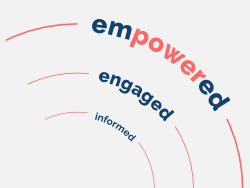Last year we wrote about the future of participatory processes in Mexico in the context of large public infrastructure projects. Our article explored how an environmental justice lens could support a bottom-up approach, deliver just outcomes, and strengthen communities from within. From the Yucatán Peninsula to the Bay Area, the context of participatory processes varies widely, but similar underlying environmental and social pressures bring into focus the need for new models of cooperation that can solve complex problems with local and global dimensions.
I set out to explore the practice of civic agency in the hope that my findings could inspire new ways to foster (and scale-up) solidarity and cooperation within and among communities. I started this research a year ago, attending public events in San Francisco and holding informal conversations with Bay Area activists and organizers. These activities provided an important foundation, but it took the challenges unleashed by the outbreak of COVID-19 to spark clarity and a sense of urgency.
As California recovers from the devastation of last year's wildfires, we brace for the worst weeks of a global pandemic that requires a large majority of the population to shelter in place. The interconnectedness of human and natural systems has never been so palpable: we face an uncertain future where problems of great magnitude and complexity will require unprecedented cooperation at all scales.
I think of civic agency as the sustained cooperation, and well-informed collective action needed to solve complex problems with local and global dimensions. I started using this concept to outline what I saw as the shortcomings of traditional participatory processes (often referred to as public outreach, community engagement, or civic engagement). While these practices differ in expectations, level of involvement, and quality of outcomes, communities are demanding new strategies that can help them navigate more complexity in solidarity.

At the local community events I attended, I heard community members demanding effective overview of the forces transforming their neighborhoods. From infrastructure upgrades, to land use policy and workforce development, communities are eager to understand local projects in the context of larger issues such as climate change, sea level rise, economic development and public health. I particularly remember a San Francisco Bayview resident wondering how the project being discussed would affect the neighborhood's (and the City's) emergency preparedness strategy. The most pressing public concerns, health, basic infrastructure, economic opportunity, community stability, and environmental degradation, are interconnected.
Solving complex problems for an uncertain future is the common denominator of the public infrastructure projects my design practice is part of. The public agencies we collaborate with are planning for a variety of outcomes, and in the process they are making our infrastructure more adaptable and sustainable. However, these agencies were set up in a time when linear problem solving was the norm and the framework for inter-agency cooperation is clunky and ineffective. Evidently, there is a need to evolve the way communities engage in planning for the future, but perhaps this starts by changing how projects are defined and how they are delivered.
Many community activists and organizers called out the lack of representation of communities of color, young people, and vulnerable populations in traditional participatory processes. At public meetings, there is a growing awareness of who is missing in the room, and in more than one occasion community members were vocal about this issue. Vulnerable communities are battling a legacy of environmental and social injustice issues and failing to engage them in a meaningful way perpetuates such injustices.
Centralized community events such as town halls, are great at establishing a baseline and providing general information to large audiences. These events are one of the many tactics that make up a comprehensive engagement strategy. A more granular approach is needed to reach deeper into communities and beyond the stakeholders that have the time, disposition, and resources to participate. But perhaps the most important question is whether engagement strategies are being specifically designed to deliver just outcomes.
I believe fostering a sense of civic agency will help communities and public agencies navigate greater complexity in solidarity. But, what might this look like in practice?
I often tell people that I am in the business of "finding the others", a quote famously attributed to Timothy Leary. And in that spirit, I am looking to connect with others who, having identified similar challenges, are actively working towards solutions that will shape the future of civic agency.